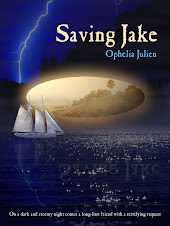Before I released the book Haunted to kick off my Bridgeton Park Cemetery Series, a fellow writer who read the manuscript asked me how I could write a story where none of the characters doubted the supernatural. She found it unrealistic that no one in the story, especially the adults, questioned the idea that ghosts even exist, let alone that someone could be communicating with the dead. Her question took my by surprise, although I guess it shouldn't have.
It's not that I don't know skeptics and disbelievers in my own life. I think it's probably that I am more likely to spend time with those who share my beliefs, even if just a little. I also don't talk about supernatural concerns when surrounded by people who don't believe in these things anyway. I'm not trying to convert anyone to my way of thinking and I don't like being mocked. I also don't like feeling I need to defend my private beliefs, so it's easier just not to say a word in this direction.
But since the question had come up, I reread my manuscript in light of what my fellow writer had said, and in the end, I decided to go with the story the way I had written it. Part of it was that it still rang true to me, even after she had raised the thought.
The other part of it is purely about the story structure itself. All of us know books and movies where one of the subplots -or maybe even the whole plot- revolves around the haunted or troubled protagonist trying to convince his or her friend, relative, lover, spouse, etc, that what is going on is very real. As a writer and a reader, I kind of, well, loathe that device. I feel like it sucks energy from the real story, which is supernatural, and wastes time and the reader's goodwill. Unless the point of the book is to watch a character move from utter disbelief to total immersion into the paranormal, the whole there's-a-reasonable-explanation-for-what-is-happening thing just feels like a very tired cliche to me.
While I understand that having a nonbeliever slow down the main character's quest, or throw a wrench in the works, or raise a needed complication, is a workable story pacing technique, I prefer a workaround to that entire concept. I get impatient with the whole "Please, you've got to believe me!" scenarios and wind up shouting at the TV "They're never going to believe you! They're never going to get it! Go find a fellow believer and take care of your problem without this person!" Of course, that never happens -the TV never listens to me, dang it- but I always feel irked when I watch a scene like that.
I hope that everyone who reads this little blog also reads my hero, Stephen King. I have read quite a bit of him -not as much as Jim has, but quite a bit- and I don't remember running into that particular plot device in ANY of the books I've read. I figure if Mr. King doesn't need to waste the reader's time and energy on such a worn-out (and irritating) plot device, then I won't either. None of the stories I read over and over, whether it be Stephen King, Noel Hynd, Richard Peck, or any of my other fave supernatural and horror writers, ever includes The Official Disbeliever.
Perhaps the disbeliever is supposed to be the character that doubtful readers can identify with. Well, if that's the case, why this person reading a horror story anyhow? If none of this is ever going to feel real to the skeptical reader, then maybe said reader should give up horror and paranormal, and focus instead on the mainstream/general fiction genre, or even nonfiction.
Okay, rant over. I am happy to report that most of the reviews posted to Amazon about my work are from people who are happy to believe, if just for the length of the story. Even the negative reviews I have (and I do have those, believe me) have not been about skepticism, so perhaps this blog piece is preaching to the choir. At any event, now you know why you won't find any true non-believing characters in my work. I may not always succeed, but I prefer finding different ways to pace the flow of each tale other than relying on the old skeptic in the supernatural story.





No comments:
Post a Comment